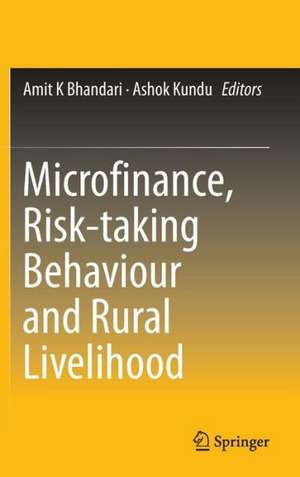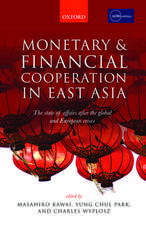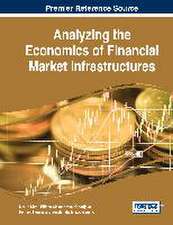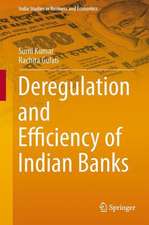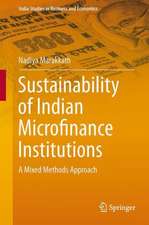Microfinance, Risk-taking Behaviour and Rural Livelihood
Editat de Amit K. Bhandari, Ashok Kunduen Limba Engleză Hardback – 27 aug 2013
| Toate formatele și edițiile | Preț | Express |
|---|---|---|
| Paperback (1) | 553.54 lei 38-44 zile | |
| Springer India – 21 aug 2015 | 553.54 lei 38-44 zile | |
| Hardback (1) | 564.21 lei 38-44 zile | |
| Springer India – 27 aug 2013 | 564.21 lei 38-44 zile |
Preț: 564.21 lei
Preț vechi: 705.25 lei
-20% Nou
Puncte Express: 846
Preț estimativ în valută:
107.96€ • 113.01$ • 89.86£
107.96€ • 113.01$ • 89.86£
Carte tipărită la comandă
Livrare economică 27 martie-02 aprilie
Preluare comenzi: 021 569.72.76
Specificații
ISBN-13: 9788132212836
ISBN-10: 8132212835
Pagini: 212
Ilustrații: XXIII, 185 p.
Dimensiuni: 155 x 235 x 17 mm
Greutate: 0.48 kg
Ediția:2014
Editura: Springer India
Colecția Springer
Locul publicării:New Delhi, India
ISBN-10: 8132212835
Pagini: 212
Ilustrații: XXIII, 185 p.
Dimensiuni: 155 x 235 x 17 mm
Greutate: 0.48 kg
Ediția:2014
Editura: Springer India
Colecția Springer
Locul publicării:New Delhi, India
Public țintă
ResearchCuprins
Chapter 1: Structural Transformation of Rural Finance in India: A Critical Review.- Chapter 2: Risk Taking Behaviour in Financial Decision Making: A Village Level Study.- Chapter 3: Impacts of Caste, Risk, and Time Preference on Borrowing Behavior: A Case Study in West Bengal, India.- Chapter 4: Microfinance and Rural Entrepreneurship: An Assessment.- Chapter 5: SHGs for Poverty Alleviation? Perspectives from a Tamil Nadu Village under Rapid Economic Development.- Chapter 6: Achievements and Challenges of SHG-Bank Linkage Program in India: The Result of Village Surveys in Andhra Pradesh and Maharashtra.- Chapter 7: Synergistic Effects of microfinance through SHGs: A Study of basic Health and Primary Education indicators.- Chapter 8: For a Better World: Livelihood Security Measurement of the SHG Members.- Chapter 9: Public Spending and Rural Livelihood in India: A Study of MGNREGA.- Chapter 10: Factual Achievementof MGNREGA: Calls for an Optimal Planning using Fuzzy Logic.
Notă biografică
Dr. Amit K. Bhandari is presently an Assistant Professor in Economics at R. B. C. E College, Founder President of the Kalyani Institute of Applied Research, Training and Development (KIARTD) and a Research Fellow at IZA in Bonn. He received his PhD in Economics from the University of Kalyani in 2007. He began his career as an economist in the financial services industry. He is an active researcher, consultant and author in various development issues. Formerly a lecturer at the Indian Institute of Social Welfare and Business Management (IISWBM), he founded the independent non-profit research organization KIARTD. He has published a number of research papers in reputed journals and books. He has served as a project director for a number of government-funded research projects.
Dr. Ashok Kundu is Associate Professor in Economics at R. B. C. E College. He has a PhD in Economics from the University of Kalyani. Dr. Kundu has over 20 years of teaching and research experience in different academic institutions where he has taught subjects like macroeconomics, development economics and economic history. His main research interests are in the field of rural and agricultural development, rural finance, environmental economics and economic development. He has published a number of research papers and book articles. He served as a principal investigator in several research projects funded by national and international funding agencies.
Dr. Ashok Kundu is Associate Professor in Economics at R. B. C. E College. He has a PhD in Economics from the University of Kalyani. Dr. Kundu has over 20 years of teaching and research experience in different academic institutions where he has taught subjects like macroeconomics, development economics and economic history. His main research interests are in the field of rural and agricultural development, rural finance, environmental economics and economic development. He has published a number of research papers and book articles. He served as a principal investigator in several research projects funded by national and international funding agencies.
Textul de pe ultima copertă
Microfinance, risk taking behavior and rural livelihood are the three dominating issues in the rural financial landscape. Inadequate access to financial services is considered to be one of the main reasons behind inadequate economic opportunity and poverty in rural India. Microfinance has played a significant role in shaping the rural financial scenario. There is a need for micro-finance institutions to focus on a heterogeneous demand structure for the financial services provided to the rural poor. This book aims to provide an up-to-date and in-depth analysis of borrowing and risk taking behavior of rural people, which might help to design financial products and delivery of services in the rural market. It attempts to highlight and review the actual meaning, functions and challenges of microfinance through SHGs in the rapidly changing rural scenario and livelihood aspects of the group members. In addition, the present volume also investigates the effectiveness of government schemesto promote rural development. It is intended for those who are interested in understanding the grassroots reality of the Indian rural financial sector.
Caracteristici
Decoding the functioning of microfinance in a rapidly changing rural scenario Addresses the issue of borrowing and risk taking behavior of rural people Examines the scope of implementation of government programmes and schemes for rural livelihoods
